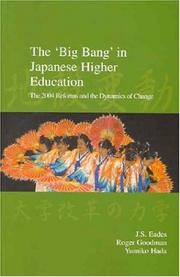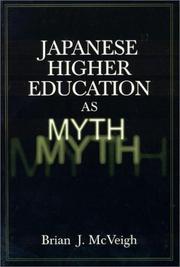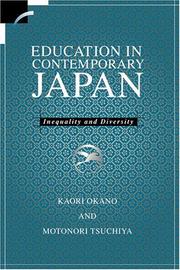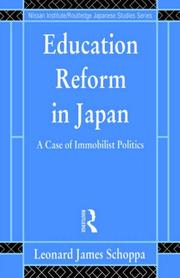| Listing 1 - 10 of 17 | << page >> |
Sort by
|
Book
ISBN: 4793701213 9784793701214 Year: 1992 Publisher: Tokyo : Ministry of Education, Science and culture,
Abstract | Keywords | Export | Availability | Bookmark
 Loading...
Loading...Choose an application
- Reference Manager
- EndNote
- RefWorks (Direct export to RefWorks)
Book
ISBN: 222204782X Year: 1993 Publisher: Paris CNRS
Abstract | Keywords | Export | Availability | Bookmark
 Loading...
Loading...Choose an application
- Reference Manager
- EndNote
- RefWorks (Direct export to RefWorks)
Education --- Education and state --- History --- Social aspects --- Histoire --- Politique gouvernementale --- Aspect social --- J4900.70 --- J4900.90 --- J4901 --- Japan: Education -- history -- Kindai (1850s- ), bakumatsu, Meiji, Taishō --- Japan: Education -- history -- postwar Shōwa (1945- ), Heisei period (1989- ), contemporary --- Japan: Education -- policy, legislation, guidelines, codes of behavior --- Japan

ISSN: 14439670 ISBN: 1876843233 Year: 2005 Publisher: Rosanna Trans Pacific
Abstract | Keywords | Export | Availability | Bookmark
 Loading...
Loading...Choose an application
- Reference Manager
- EndNote
- RefWorks (Direct export to RefWorks)
Education, Higher --- Educational change --- Enseignement supérieur --- Enseignement --- Réforme --- J4900.90 --- J4965 --- 378.4 <520> --- Japan: Education -- history -- postwar Shōwa (1945- ), Heisei period (1989- ), contemporary --- Japan: Education -- higher education --- Universiteiten--Japan --- 378.4 <520> Universiteiten--Japan --- Enseignement supérieur --- Réforme --- Universities and colleges
Book
ISBN: 0691093857 1306988942 0691615772 1400853710 0691643156 0691100888 9781400853717 9780691615776 Year: 2014 Publisher: Princeton, NJ
Abstract | Keywords | Export | Availability | Bookmark
 Loading...
Loading...Choose an application
- Reference Manager
- EndNote
- RefWorks (Direct export to RefWorks)
On the basis of direct personal observation in the classroom, systematically gathered data, and extensive reading in primary sources, the author provides a rich description of how a society can be gradually transformed by the educational process in its schools. He then relates this process to the problems of the advanced industrial world.Originally published in 1980.The Princeton Legacy Library uses the latest print-on-demand technology to again make available previously out-of-print books from the distinguished backlist of Princeton University Press. These editions preserve the original texts of these important books while presenting them in durable paperback and hardcover editions. The goal of the Princeton Legacy Library is to vastly increase access to the rich scholarly heritage found in the thousands of books published by Princeton University Press since its founding in 1905.
Education --- Educational equalization --- History --- Educational inequality --- Equal education --- Equal educational opportunity --- Equalization, Educational --- Affirmative action programs in education --- Aims and objectives --- Educational equality --- Educational equity --- Equality of education --- Equity, Educational --- Inequality, Educational --- Opportunity, Equal educational --- J4931 --- J4900.90 --- Japan: Education -- theory, methodology and philosophy (pedagogy) --- Japan: Education -- history -- postwar Shōwa (1945- ), Heisei period (1989- ), contemporary

ISBN: 076560924X 0765611775 9780765611772 9781317467021 1317467027 9780765609243 0765609258 9780765609250 1315703165 1317467035 9781315703169 9781317467014 Year: 2002 Publisher: Armonk, N.Y. M.E. Sharpe
Abstract | Keywords | Export | Availability | Bookmark
 Loading...
Loading...Choose an application
- Reference Manager
- EndNote
- RefWorks (Direct export to RefWorks)
In this dismantling of the myth of Japanese ""quality education"", McVeigh investigates the consequences of what happens when statistical and corporatist forces monopolize the purpose of schooling and the boundary between education and employment is blurred.
Education, Higher --- Enseignement supérieur --- J4900.90 --- J4965 --- 378.4 <520> --- College students --- Higher education --- Postsecondary education --- Universities and colleges --- 378.4 <520> Universiteiten--Japan --- Universiteiten--Japan --- History --- Japan: Education -- history -- postwar Shōwa (1945- ), Heisei period (1989- ), contemporary --- Japan: Education -- higher education --- Education

ISBN: 1873410107 Year: 1991 Publisher: Sandgate Japan library
Abstract | Keywords | Export | Availability | Bookmark
 Loading...
Loading...Choose an application
- Reference Manager
- EndNote
- RefWorks (Direct export to RefWorks)
J4900.90 --- J3390 --- J4000.90 --- Japan: Education -- history -- postwar Shōwa (1945- ), Heisei period (1989- ), contemporary --- Japan: History -- Gendai, modern -- postwar Shōwa (1945- ), Heisei period (1989- ), contemporary --- Japan: Social history, history of civilization -- postwar Shōwa (1945- ), Heisei period (1989- ), contemporary --- Education --- Aims and objectives --- Social aspects --- History --- Japan --- 20th century --- Education - Japan - History - 20th century. --- Education - Social aspects - Japan. --- Education - Japan - Aims and objectives. --- Japan - History - 20th century.

ISBN: 0521626862 9780521626866 Year: 1999 Publisher: Cambridge Cambridge University press
Abstract | Keywords | Export | Availability | Bookmark
 Loading...
Loading...Choose an application
- Reference Manager
- EndNote
- RefWorks (Direct export to RefWorks)
Education --- School management and organization --- Social aspects --- Case studies --- J4900.90 --- J4952 --- J4127 --- Japan: Education -- history -- postwar Shōwa (1945- ), Heisei period (1989- ), contemporary --- Japan: Education -- school life (including ijime) --- Japan: Sociology and anthropology -- social identity and self --- Historische en vergelijkende pedagogiek --- Case studies. --- Historische en vergelijkende pedagogiek. --- Children --- Education, Primitive --- Education of children --- Human resource development --- Instruction --- Pedagogy --- Schooling --- Students --- Youth --- Civilization --- Learning and scholarship --- Mental discipline --- Schools --- Teaching --- Training --- Education - Social aspects - Japan --- School management and organization - Japan --- Education - Japan - Case studies
Book
ISBN: 1439918570 9781439918579 1439918554 1439918562 9781439918555 Year: 2019 Publisher: Philadelphia Temple University Press
Abstract | Keywords | Export | Availability | Bookmark
 Loading...
Loading...Choose an application
- Reference Manager
- EndNote
- RefWorks (Direct export to RefWorks)
The creation of a new school system in the Philippines in 1898 and educational reforms in occupied Japan, both with stated goals of democratization, speaks to a singular vision of America as savior, following its politics of violence with benevolent recuperation. The pedagogy of recovery--in which schooling was central and natives were forced to accept empire through education--might have shown how Americans could be good occupiers, but it also created projects of Orientalist racial management: Filipinos had to be educated and civilized, while the Japanese had to be reeducated and "de-civilized." In Campaigns of Knowledge, Malini Schueller contrapuntally reads state-sanctioned proclamations, educational agendas, and school textbooks alongside political cartoons, novels, short stories, and films to demonstrate how the U.S. tutelary project was rerouted, appropriated, reinterpreted, and resisted. In doing so, she highlights how schooling was conceived as a process of subjectification, creating particular modes of thought, behaviors, aspirations, and desires that would render the natives docile subjects amenable to American-style colonialism in the Philippines and occupation in Japan.
Educational change --- Change, Educational --- Education change --- Education reform --- Educational reform --- Reform, Education --- School reform --- Educational planning --- Educational innovations --- History --- E-books --- J4900.90 --- J3389 --- J4991.27 --- S31/0400 --- Japan: Education -- history -- postwar Shōwa (1945- ), Heisei period (1989- ), contemporary --- Japan: History -- Gendai, modern -- Shōwa period -- World War II -- occupation period (1945-1952) --- Japan: Education in other countries and Japanese students abroad -- Southeast Asia -- Philippines --- Indo China and South East Asia--South East Asia general (Philippines, Malaysia, Indonesia, Burma, Papua New Guinea)
Book
ISBN: 0857452681 9780857452689 9780857452672 1306548004 9781306548007 0857452673 Year: 2011 Publisher: New York Oxford
Abstract | Keywords | Export | Availability | Bookmark
 Loading...
Loading...Choose an application
- Reference Manager
- EndNote
- RefWorks (Direct export to RefWorks)
In many societies today, educational aims or goals are commonly characterized in terms of "equality," "equal opportunity," "equal access" or "equal rights," the underlying assumption being that "equality" in some form is an intelligible and sensible educational ideal. Yet, there are different views and lively debates about what sort of equality should be pursued; in particular, the issue of equality of educational opportunity has served as justification for much of the postwar restructuring of educational systems around the world. The author explores different interpretations of the concept of equality of educational opportunity in Japan, especially as applied to post-World War II educational policies. By focusing on the positions taken by key actors such as the major political parties, central administrative bodies, teachers' unions, and scholars, he describes how their concepts have developed over time and in what way they relate to the making of educational policy, especially in light of Japan's falling birthrate and aging society.
Educational planning --- Educational equalization --- Education and state --- J4901 --- J4900.70 --- J4900.90 --- Educational equality --- Educational equity --- Educational inequality --- Equal education --- Equal educational opportunity --- Equality of education --- Equalization, Educational --- Equity, Educational --- Inequality, Educational --- Opportunity, Equal educational --- Education --- Affirmative action programs in education --- Japan: Education -- policy, legislation, guidelines, codes of behavior --- Japan: Education -- history -- Kindai (1850s- ), bakumatsu, Meiji, Taishō --- Japan: Education -- history -- postwar Shōwa (1945- ), Heisei period (1989- ), contemporary --- Aims and objectives

ISBN: 041502062X 0415096006 1138173142 1134865163 0203303466 0203034600 1134865171 1280331259 Year: 1991 Publisher: London Routledge and Kegan Paul
Abstract | Keywords | Export | Availability | Bookmark
 Loading...
Loading...Choose an application
- Reference Manager
- EndNote
- RefWorks (Direct export to RefWorks)
School management --- Japan --- J4901 --- J4900.90 --- Education --- -Education and state --- -Politics and education --- Education policy --- Educational policy --- State and education --- Social policy --- Endowment of research --- Children --- Education, Primitive --- Education of children --- Human resource development --- Instruction --- Pedagogy --- Schooling --- Students --- Youth --- Civilization --- Learning and scholarship --- Mental discipline --- Schools --- Teaching --- Training --- Japan: Education -- policy, legislation, guidelines, codes of behavior --- Japan: Education -- history -- postwar Shōwa (1945- ), Heisei period (1989- ), contemporary --- History --- -History --- Government policy --- -Japan: Education -- policy, legislation, guidelines, codes of behavior --- Education and state --- Political aspects&delete& --- 1945 --- Education - Japan - History - 1945 --- -Politics and education - Japan - History. --- Education and state - Japan - History. --- Political aspects
| Listing 1 - 10 of 17 | << page >> |
Sort by
|

 Search
Search Feedback
Feedback About UniCat
About UniCat  Help
Help News
News